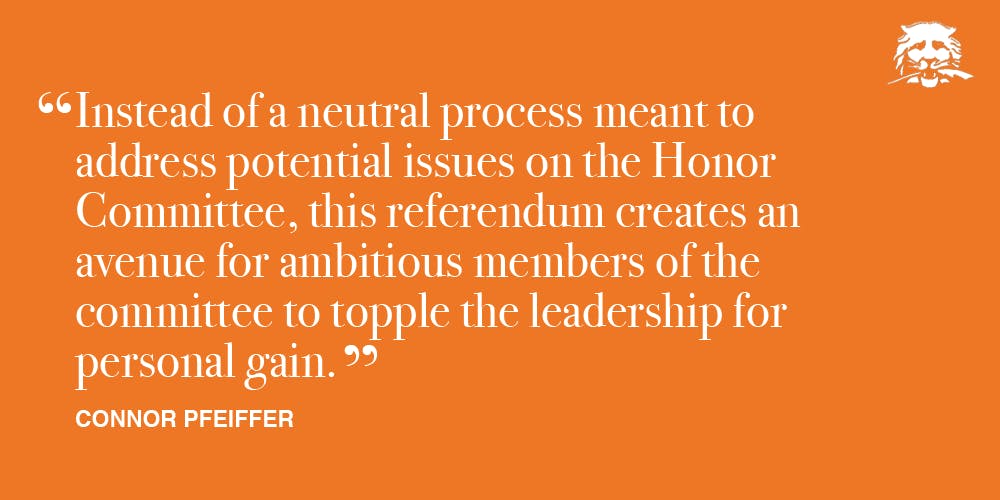This week, the USG election ballot includes yet another referendum to amend the Honor Constitution. Unlike the referenda from the fall, however, this proposal does not touch on the committee’s penalties or procedures. Instead, it focuses on the leadership of the committee itself. The referendum, if adopted, would create a procedure for a member of the Honor Committee to challenge the incumbent chair or clerk for their position. Regardless of your views on the Honor Committee and the fall referenda, this proposal should concern every student. It will create turmoil and uncertainty, not accountability, harming the interests of students who interact with the committee. All disciplinary bodies at the University should be held accountable, including the Honor Committee, but the model proposed by the referendum is deeply flawed. I strongly urge students to vote no.
The proposed evaluation process includes several steps. A member of the Honor Committee can initiate the process by submitting a statement to the USG president and chair outlining their grievances against the chair or clerk. If they move forward to the next step, a committee of current and former members of the Honor Committee and USG elected officials would evaluate both the member issuing the challenge and the incumbent chair or clerk. With a two-thirds majority, this committee can replace the chair or clerk with the challenger.
This accountability measure is flawed because of the Honor Committee’s strict confidentiality rules. For the protection of students who interact with the committee, all of its work is completely confidential. USG members, who would make up two-thirds of the evaluation committee, are not privy to the actions of the chair, clerk, or other members of the Honor Committee during cases and investigations, making it difficult to fairly assess the conduct and job performance of the incumbent chair or clerk. In fact, it is unclear what factors the evaluation process could even consider when judging the incumbent and challenger. The amendment does not specify what would constitute proper grounds for an evaluation, and there is no burden of proof for the evaluation committee to use in its interviews or final vote. These interviews have the potential to devolve into character attacks and focus on useless generalities that cannot be backed up with specific evidence because of confidentiality restrictions. This attempt to bring more “accountability” to the committee leadership, in reality, would subject the chair and clerk to a questionable and incomplete evaluation process.
Additionally, the threat of a challenge creates perverse incentives within the committee. A concern about an unfair and potentially public challenge could cause a chair or clerk to make different judgement calls because of pressure from individual members of the Honor Committee, even if they believe that another course is more prudent. This would undermine the entire point of having a leader with the authority to make difficult decisions. The fact that the challenger replaces the chair or clerk in question is also problematic. Instead of a neutral process meant to address potential issues on the Honor Committee, this referendum creates an avenue for ambitious members of the committee to topple the leadership for personal gain. It also allows former applicants for the clerk position who were not selected as sophomores to question that decision through accusations of misconduct against their colleague as a way to replace them. While the referendum explanation claims that this procedure would only occur in “rare cases,” its existence alone is concerning and does not increase accountability.
Further, accountability checks already exist for these positions. Under the current system, the chair and clerk go through several stages of appointment with accountability to USG before assuming their position. Each committee member’s original appointment (excepting class presidents) required approval by a joint Honor Committee-USG committee and confirmation by the USG Senate. The clerk is appointed by a subcommittee composed of seniors on the Honor Committee, the outgoing clerk, and the USG President. The clerk becomes chair after serving under their predecessor. Additionally, like any other member of the Honor Committee the chair or clerk can be removed by a vote of 12 of the other 14 members of the committee “for neglect of duty.” Finally, any student found responsible for violating the Honor Code can appeal the committee’s decision to the Dean of the College, providing yet another check on the work of the chair and clerk.
Campus conversation on the Honor Committee during the fall referenda campaign raised some valid concerns about accountability and the committee’s work. This amendment, however, is not a responsible accountability mechanism for the reasons outlined here. The potential for an outside committee to impose new leadership on the Honor Committee raises significant concerns about the effectiveness of the new chair or clerk, who were not chosen by their peers but, instead, by an evaluation committee mostly composed of USG officials. It is also notable that this proposal focuses on just the chair and clerk, not other members of the Honor Committee. Misconduct and neglect of duty by a rank-and-file member of the committee can be just as harmful as problems at the top during investigations and hearings, yet there are few mechanisms for a chair or clerk to hold members accountable besides removal, which requires near unanimity from the rest of the committee. This amendment to the Honor Constitution will not make the Honor Committee more accountable, and the student body should reject it when voting this week.
Connor Pfeiffer is a senior in the history department from San Antonio, Texas. He can be reached at connorp@princeton.edu.








